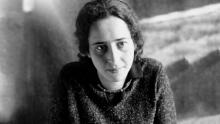Hannah Arendt was born 14 October 1906 in Hannover, Germany. Her parents, Martha and Paul Arendt, were of Russian-Jewish background. Her father, an engineer, died from syphilitic insanity in 1913. Seven years later, her mother married Martin Beerwald. Arendt attended school in Koenigsberg and finished in 1924. She attended Marburg, Freiburg and Heidelberg, studying theology and philosophy. She eventually attained her doctorate on St. Augustine in 1929.
Unsurprisingly for an intellectual with a Jewish background in 1930s Germany, Arendt did not enjoy a smooth transition from being a student to finding an academic appointment. Shortly after receiving her doctorate, she turned her attention to German Jews and the emerging anti-Semitism. She wrote a biography of Rahel Varnhagen, a nineteenth-century Jewish woman who repudiated her Jewishness. By 1933 Arendt was assisting the German Zionist Organisation and was arrested by the Gestapo. She escaped to Paris, but again ran into difficulty when France was invaded.
In May 1941 Arendt escaped to America, where she was granted citizenship a decade later. Living in New York, she began writing and in 1946 became chief editor of Schocken Books, a German Jewish publishing firm. After the Holocaust, she was appointed executive director of the Jewish Cultural Reconstruction project, and from 1953 to 1975 she held academic posts at the University of Chicago and the New School for Social Research in New York.
One of Arendt’s best-known works is The Origins of Totalitarianism, published in 1951, in which she explored the twentieth-century phenomenon of totalitarianism, and sought to understand the specific social and political conditions that allowed it to emerge. She possessed the insight to highlight the parallels between Nazi Germany and Stalinist Russia, showing how forces present in society can develop into murderous and evil domination. In her subsequent works, such as The Human Condition (1958) and Between Past and Future (1961), she moved away from history and attempted to develop a constructive political philosophy, looking back to the Greek Polis as a model for the ideal relation between the public and the political.
Arendt is well known for her controversial 1963 work Eichmann in Jerusalem: A Report on the Banality of Evil. This book was adapted from articles she had produced covering the trial of the SS colonel lieutenant Eichmann. Principal to the work was her incisive observation that Eichmann was not the embodiment of savage radical evil, but instead a relatively ordinary man who followed orders. Her reflections on his case led in part to the development of her views on judgment, presented in her Gifford Lectures, entitled ‘The Life of the Mind’ (1978). Arendt, the first female Gifford Lecturer, delivered her lectures in Aberdeen between 1972 and 1974. She suffered a heart attack in Aberdeen, and then a second fatal coronary on 4 December 1975.
Some of Arendt’s other works include: On Revolution (1963); Men in Dark Times (1968); The Jew as Pariah: Jewish Identity and Politics in the Modern Age (1978); The Life of the Mind (1978); and Lectures on Kant’s Political Philosophy (1982).



